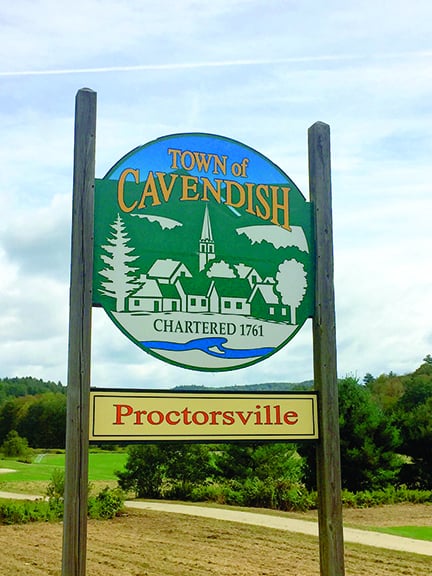
CAVENDISH, Vt. – State Representative John Arrisson attended the Monday, Aug. 14, Cavendish Selectboard meeting, to address the board and those present regarding the reappraisal notice the town had received from the state. Arrisson explained that the high sales prices over the last few years have triggered many reappraisals, but suggested the board put it off as long as possible, and said there was a window to appeal the requirement.
Since Cavendish had reappraised in 2019, the town hasn’t had much time to collect funds to pay for another reappraisal, and Arrison warned that it could be a significant expense.
“Part of Act 46,” said Arrison, “is that [it requires] a report by December of this year from the tax department on implementing a state-wide reappraisal – in other words, you folks won’t have to worry about it again. Then, by December of 2024, they have to have the final plan.” Arrison advised the board to talk to the New England Municipal Resource Center (NEMRC) about appealing the appraisal requirement, and take the next few years to accumulate the funds to cover the cost.
Resident Chris Chadwick presented the board with a list of questions regarding his potential purchase of the old Academy Building. Chadwick reported that he is trying to get the restoration project going by this fall, and will need permission to draw up a new deed allowing for residential rentals, address issues of parking, snow removal, and historic preservation, and determine the official property line. “It’s a historic building, it just needs to be tended to. I’m willing to tend to it, but I need some questions answered before we can go forward with buying it.”
Chadwick also asked the board what the plan was for cleaning up Greven Field. The sports field and recreational area was destroyed in the July flooding. Chadwick mentioned he’d read online that Black River Action Team (BRAT) had plans to go in there, but Town Manager Rick Chambers said equipment would be needed first, before the area would be safe enough for people to enter.
“I don’t believe they’re going to go in there right off,” Chambers replied, calling the area “a liability” and “dangerous.” He said the fence and building had to be taken down before volunteers would be allowed in.
Chadwick relayed an assessment he’d received from a vendor he works with, which reported that the perimeter fencing was likely non-salvageable, but the town may be able to recoup some of its loss by selling the materials to a recycling company.
According to former recreation director Terry O’Brien, Chadwick reported, the field can be rebuilt, and Chadwick had already taken some steps to see how that could happen, while considering precautionary changes to help prevent re-flooding damage. For instance, Chadwick suggested, make the dugouts out of cinder blocks, and install a plastic, removable fence during baseball season. He said he’s approached LaValley’s Building Supply, who offered to help offset the costs of building materials, and a local excavation company was willing to offer a discount to work on the clean-up.
Margo Caulfield mentioned there were FEMA guidelines for building recreation fields in flood zones. Chambers reiterated that the town would need to do a lot more planning before the field could be rebuilt. “If something is done there, it has to be done correctly and within the regulations,” stated Chambers.
Caulfield reminded the board that current recreational director Stephanie Knockenhauer should be involved, and everyone agreed. The first thing that will need to occur, Chadwick expressed, is the road leading into the field needs to be built back up, as equipment cannot access that area currently. Since it is town property, Chambers said they had the ability to bring some resources to that project.
Chambers reported that the town Emergency Relief Assistance Funding (ERAF) rating is at 17.5%, and they will now get an extra 10% in state funding for flood repairs. He also took a moment to remind the board that the town has Flood Hazard Area Regulations (FHAR), which need to be in place as a requirement to participate in the National Flood Insurance Program. Chambers said, “These regulations can be found on the town’s website, and we are just now putting together new permit applications and checklists which will accompany our building permits in the future. People should really be looking to the town, if and when they are ready to rebuild anything on their property, contacting us to receive the proper permits to do so.”
According to Chambers, the update on town road conditions was, “Beautiful! Much better than they were a month ago!” He went on to mention what an incredible job the town highway department and local contractors have done, and that most roads are now passable, with the exception of parts of Bailey Hill Road, Chaos Turnpike, and Depot Street, which are still closed. Chambers said he did not know when Route 131 would reopen, and that he believed the state was waiting on the delivery of guardrails, and continuing repair work to damaged sections.
Board member Shannon Devereux brought up Quent Phelan Road, which, she and Chambers agreed, was “in sad shape.” Chambers outlined some issues with the road’s repair, stating that it was beyond patching, and needs to be rebuilt before repaving. There was some discussion about keeping it a dirt/gravel road for the winter.
The board decided to wait to sign the proposed Solar Bond Note, after Chambers reported that town clerk and treasurer Diana McNamara was looking for additional quotes, hoping to get a better interest rate.
The Golden Stage Inn received an event permit to serve alcohol at the annual Golden Honey Festival, which will be held on Sept. 9, from 10 a.m. – 4 p.m.
The board’s next meeting will be held at 6:30 p.m., on Monday, Sept. 11.